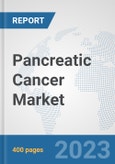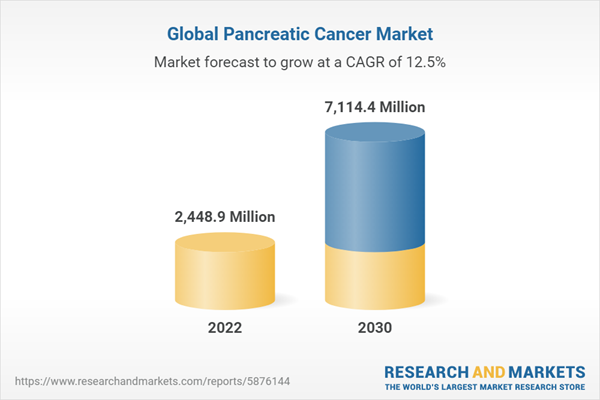Rising rates of pancreatic cancer cases and frequency drive the market for pancreatic cancer market. As per the WCRF International, “it is stated that pancreatic cancer is the 12th most common cancer worldwide. Pancreatic cancer is majorly caused due to obesity, diabetes, and extremely tall height. For instance, The International Diabetes Foundation estimates that there are 537 million people (20-79 years old) who have diabetes worldwide. There will be 643 million diabetics globally by 2030, and there will be 783 million by 2045. Another factor fueling the demand for the pancreatic cancer market is rising government initiatives and improving healthcare infrastructure. Companies are collaborating with the government and other public organizations to cure pancreatic cancer. For instance, Servier announced today, in collaboration with the International Society for Clinical Oncology (ISCO) and the Egyptian Foundation for Medical Sciences (EFMS), the launch of its treatment for pancreatic cancer in Egypt.
The global pancreatic cancer market is bifurcated by type, treatment type, diagnosis route of administration, and distribution channel. By type, the segment is further bifurcated into exocrine and endocrine. The exocrine segment is anticipated to grow at a faster rate than the market growth during the forecast period. Exocrine pancreatic cancer develops from exocrine cells, which make up the exocrine gland and ducts of the pancreas. To cure Exocrine Pancreatic Cancer surgery is conducted to remove the tumor, relieve the symptoms, or prevent complications. Radiation treatments, which use X-rays to kill cancer cells. Chemotherapy is also suggested with chemicals or drugs. Immunotherapy or biological therapy is also an effective treatment. According to an article published on pancreatic adenocarcinoma, 90 % of pancreatic cancer is arising in the exocrine glands of the pancreas, and pancreatic neuroendocrine tumor which is less common occurs in the endocrine tissue of the pancreas.
The global pancreatic cancer market is segmented into the Asia Pacific, North America, Europe, the Middle East & Africa, and South America. North America is predicted to be the fastest-growing region within the global market share. The U.S. is expected to hold onto a sizable market share due to its high expenditures on healthcare, compassionate reimbursement procedures, and rising pancreatic cancer occurrence. According to the National Program of Cancer Registries database,” encompassing almost 65% of the U.S. population, indicates that the incidence of pancreatic cancer is rising faster in people under the age of 55 than in people beyond the age of 55, and more quickly in women than in males. “For instance, The Advanced Research Projects Agency for Health (ARPA-H) has President Biden's bold new vision for biomedical and health research. The objective of this organization is to increase the capacity of the American government to expedite research that can enhance human health and to increase our capacity to prevent, detect, and treat a variety of diseases, including pancreatic cancer.
Report Findings
1) Drivers
- Rising rates of pancreatic cancer cases and frequency drive the market for pancreatic cancer market.
- Rising government initiatives and improving healthcare infrastructure fuels the market for pancreatic cancer treatment.
2) Restraints
- High cost and side effects associated with treatment are likely to hamper the pancreatic cancer market growth.
3) Opportunities
- Advancements in diagnostic technology and the development of drugs fuels the pancreatic cancer market.
Research Methodology
A) Primary Research
The primary research involves extensive interviews and analysis of the opinions provided by the primary respondents. The primary research starts with identifying and approaching the primary respondents.The primary respondents are approached include
1. Key Opinion Leaders2. Internal and External subject matter experts
3. Professionals and participants from the industry
The primary research respondents typically include
1. Executives working with leading companies in the market under review2. Product/brand/marketing managers
3. CXO level executives
4. Regional/zonal/country managers
5. Vice President level executives.
B) Secondary Research
Secondary research involves extensive exploring through the secondary sources of information available in both the public domain and paid sources. Each research study is based on over 500 hours of secondary research accompanied by primary research. The information obtained through the secondary sources is validated through the crosscheck on various data sources.The secondary sources of the data typically include
1. Company reports and publications2. Government/institutional publications
3. Trade and associations journals
4. Databases such as WTO, OECD, World Bank, and among others.
5. Websites and publications by research agencies
Segment Covered
The global pancreatic cancer market is segmented on the basis of type, treatment type, diagnosis, route of administration, end user, and distribution channel.The Global Pancreatic Cancer Market by Type
- Exocrine
- Endocrine
The Global Pancreatic Cancer Market by Treatment Type
- Chemotherapy
- Targeted Therapy
- Immunotherapy
- Hormone Therapy
- Others
The Global Pancreatic Cancer Market by Diagnosis
- Blood Test
- Biopsy
- Imaging Tests
- Ultrasound
- Computerized Tomography (CT) scans
- Others
The Global Pancreatic Cancer Market by Route of Administration
- Oral
- Parenteral
- Others
The Global Pancreatic Cancer Market by End User
- Hospitals
- Specialty Clinics
- Homecare
- Others
The Global Pancreatic Cancer Market by Distribution Channel
- Hospital Pharmacy
- Retail Pharmacy
- Online Pharmacy
- Others
Company Profiles
The companies covered in the report include- Bayer AG
- Mylan (is now part of Viatris)
- Teva Pharmaceutical Industries Ltd.
- Sanofi
- Pfizer Inc.
- GSK plc
- Novartis AG
- Zydus Lifesciences Ltd.
- AstraZeneca
- Johnson & Johnson Services, Inc.
What does this Report Deliver?
1. Comprehensive analysis of the global as well as regional markets of the pancreatic cancer market.2. Complete coverage of all the segments in the pancreatic cancer market to analyze the trends, developments in the global market and forecast of market size up to 2030.
3. Comprehensive analysis of the companies operating in the global pancreatic cancer market. The company profile includes analysis of product portfolio, revenue, SWOT analysis and latest developments of the company.
4. Growth Matrix presents an analysis of the product segments and geographies that market players should focus to invest, consolidate, expand and/or diversify.
Table of Contents
Companies Mentioned
- Bayer AG
- Mylan (is now part of Viatris)
- Teva Pharmaceutical Industries Ltd.
- Sanofi
- Pfizer Inc.
- GSK plc
- Novartis AG
- Zydus Lifesciences Ltd.
- AstraZeneca
- Johnson & Johnson Services, Inc.
Table Information
| Report Attribute | Details |
|---|---|
| No. of Pages | 400 |
| Published | August 2023 |
| Forecast Period | 2022 - 2030 |
| Estimated Market Value in 2022 | 2448.9 Million |
| Forecasted Market Value by 2030 | 7114.4 Million |
| Compound Annual Growth Rate | 12.5% |
| Regions Covered | Global |
| No. of Companies Mentioned | 10 |









